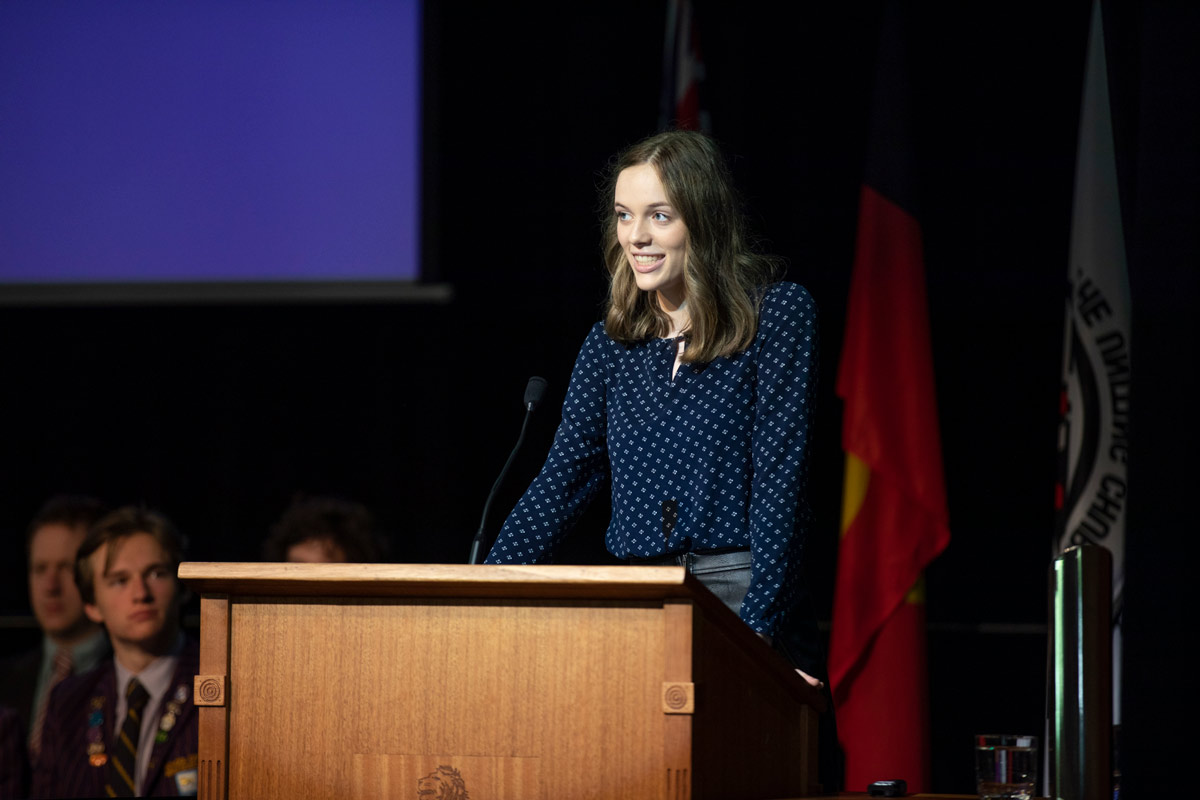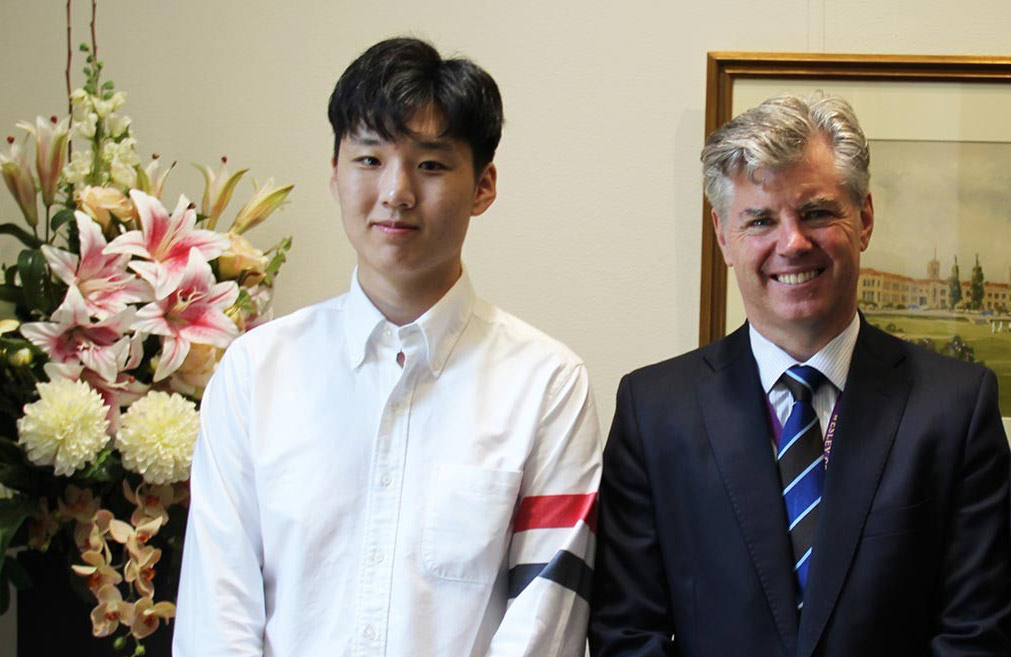
What lies at the heart of success? Is it about working hard or working smart, or about goal setting, or simply talent? Class of 2019 top achievers Natasha Stonehouse-Melke and Jacky Lyu have some answers.
Natasha Stonehouse-Melke (OW2019) and Zetian (Jacky) Lyu (OW2019) are two of the three 2019 International Baccalaureate Diploma Program (IB DP) Duces and IB DP Walter Powell Scholars at Wesley College, alongside Lucy Poole (OW2019). All three received a perfect IB DP score of 45, which is equal to the highest possible ATAR of 99.95.
These are edited versions of Natasha’s address to Senior School students at the Scholars Assembly at the Glen Waverley Campus and Jacky’s address to Senior School students at the Scholars Assembly at the St Kilda Road Campus in February.
Natasha Stonehouse-Melke's Top Tips
Success, however you define and measure it, is never achieved without the support of many people. For students in Senior School, those people include your family, your peers and your teachers. In realising how much support there is available to you, your school journey becomes considerably less intimidating. At school, your teachers and peers are your greatest resource: use them. Imagine the school year is like a season of team sport where you and your team members all play your part and benefit from each other’s strengths.
Pursuing success isn’t just about hard work; it’s also important to spend time away from your desk. This is not what I used to think. When I started Year 10, I created my 99 ATAR plan: pretty ambitious for a 15-year old who hadn’t stepped into a Senior School class yet. The plan involved dropping every cocurricular in Year 12 and limiting socialising. A week before Year 12, though, my view shifted and I no longer saw my plan as a sustainable method to achieve my goal. Instead of giving up cocurriculars, I joined the orchestra for the musical… for the first time ever. Yes, that involved a constant struggle to balance study and everything else, and I did have my laptop with me during rehearsals to whip out whenever possible to finish assignments due in the next week, but my cocurricular commitments were worth it. I learned that it’s beneficial to go to the 18th birthdays, spend time with friends and continue your interests. Doing all this is not to your academic detriment but a way to recharge your batteries.
I also learned that failure is not something to fear. Often, we hear only of people’s success, but we don’t appreciate the journey they took to get there. We see someone blitz a race or achieve an ATAR of 99.95. We don’t see the times, in my case, where I would work hard on assessments only to be marked multiple grade boundaries below what I was expecting, or where I would stare blankly at a maths problem for an hour feeling completely defeated. It’s important that you don’t lose sight of your goal if you want to get there in the end. Failure is the road to success, and those who use it as a source of motivation are the ones that succeed.
I learned you can’t just work hard; you have to work smart. Take the time to reflect on how you approach each task and the effectiveness of your methods. The stare-at-the-textbook- absorption-method is common, and I’ve tried it, but unfortunately most of us are not blessed with photographic memories. Talk with your friends to see how they approach a task, mindful that how you and they best learn won’t necessarily be the same. Next time you study for a test, try mind mapping, colour-coordinating, reciting your Language B oral to your dog. Find what works best for you. Identifying how you can most effectively approach a task will help you to work smart.
It’s also crucial that you identify what motivates you. For most of us, this has to be more than an ATAR: an unemotionally stimulating number simply can’t sustain you through the IB or VCE. Instead, look for other sources of motivation. It may be the goal of getting into your ideal university course, or the pride you feel in knowing you achieved your personal best, or your desire to improve, to be your best, or your passion for a particular field of study. If you don’t know what you are passionate about yet, that’s okay, but if you do, whatever your passion is, academic or not, harness it in pursuit of your goal. Finally, be honest about what motivates you: don’t be afraid to go pursue the career path that really excites you.
To the Class of 2020, I wish you all the best for your final year. A year sounds like a long time, but it’s really a journey that you can only complete by taking one step at a time, lots of little steps. Remember, you’re already taking them, so make the most of this year.
When you leave school, all you are left with are all those completed practice exams – hopefully – and assignments, and the fragmented memories of your time at school. Make each fragment count so that you finish school not simply with an ATAR, but feeling whole.
Natasha Stonehouse-Melke

Jacky Lyu's Top Tips
You may have heard the idea that each of us is born with a gift, and our calling is to find it and make the most of it. I’ve never believed in this idea. That’s because, growing up, I never knew if I had some sort of gift.
Let me explain.
I was born into a loving family and as an only child my parents had very high expectations of me. They wanted me to succeed academically, and in music and sporting pursuits. So I used to attend all those maths extension classes, because I should be competing in the International Mathematical Olympiad, and train as a tennis player, and – back in my school in China – rehearse in the music band every Wednesday, Friday and Saturday afternoon, because I should be performing at Vienna’s Musikverein.
Despite all of this, I could never answer the question, ‘Jacky, what is your passion?’
People would ask, ‘Do you enjoy playing drums?’ I’d reply, ‘Mmmhmm.’
‘Okay, do you enjoy playing tennis?’ I’d reply, ‘Mmmhmm.’
‘Well, do you enjoy doing maths?’ I’d reply, ‘Yeah, all right, mmmhmmmm.’
And that was me.
When I arrived at Wesley College in Year 9, I thought I was smart, but I was simply a jack-of-all trades and really the master of none. It wasn’t until the end of Year 10, when I was sitting in an awards assembly, watching my friends and classmates going up and receiving all those academic, music, arts and sports awards, that the reality finally hit: I realised that I really was not achieving my potential, and that prompted me to set some goals. That was a landmark moment for me as it was the first time I set a challenging goal that I really needed to achieve.
The goals we set really are important decisions we make. Pursuing our goals involves making difficult choices every day about how you spend your time and effort, about what you will do and won’t do, will and won’t sacrifice. Pursuing goals involves deciding what you need to focus on, what will help and what will hinder you. Success demands that you choose who you will spend your time with, keeping in mind that the people you spend the most time with could either help or hinder your progress.
While setting goals is about holding high expectations for yourself and putting in the work to get there, you also need to have some fun time, and you need a good night’s sleep. My advice is don’t stay up late: better to wake an hour earlier next morning and finish the work.
Whether your goals are academic or in the field of sports or the arts or specifically career oriented, you need to persevere. After all, there will be times where things don’t go to plan, when it’s easy to give up. Remember, during those times, that disappointment is a part of success. It’s exactly when you need to dig deep and keep going. And you learn along the way that you can actually do it. So, do not be afraid to dream big. Shoot for the stars and be the best you can be.
The American painter Bob Ross once said, ‘Talent is just a pursued interest.’ Whether or not each of us is born with a gift, life really is a marathon and nobody cares about that five metre lead at the beginning. It’s all about how we run the race and how well we finish. Just don’t stop.
Jacky Lyu
